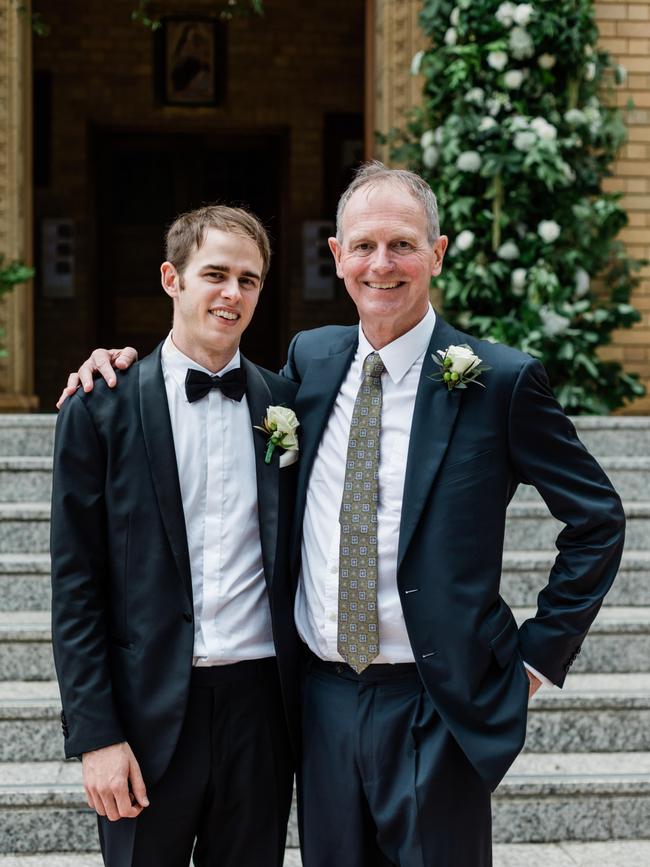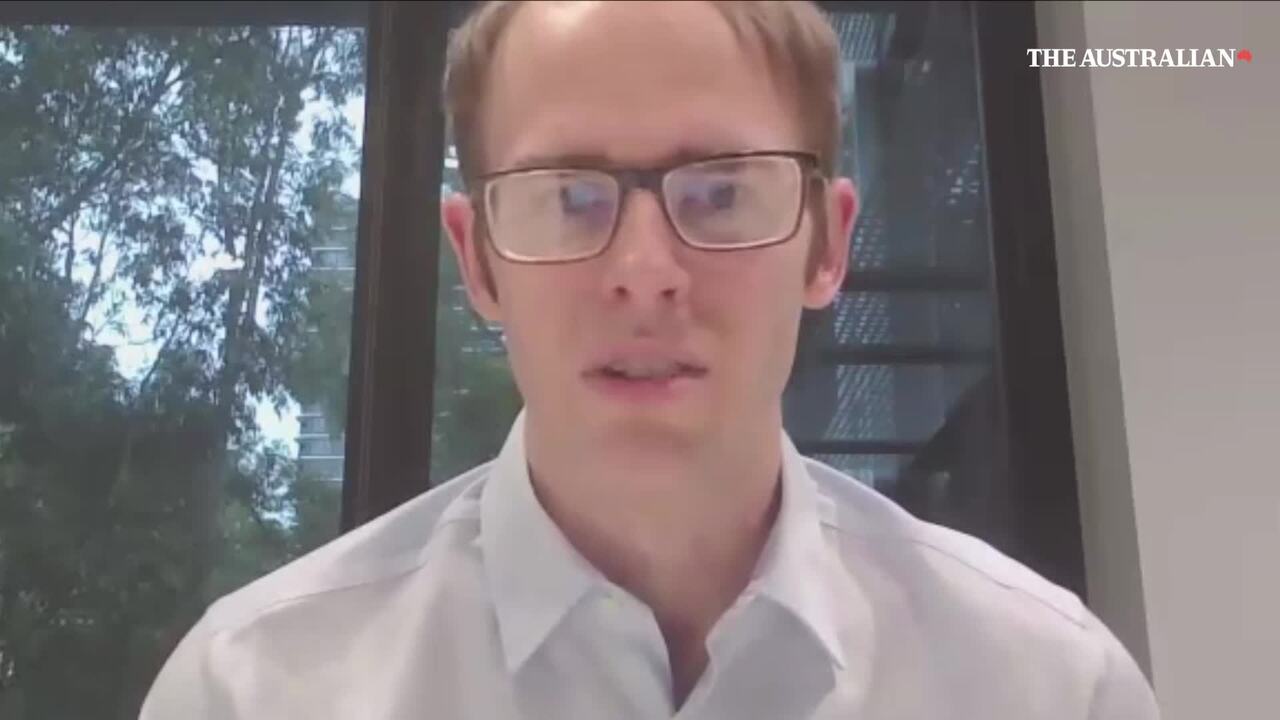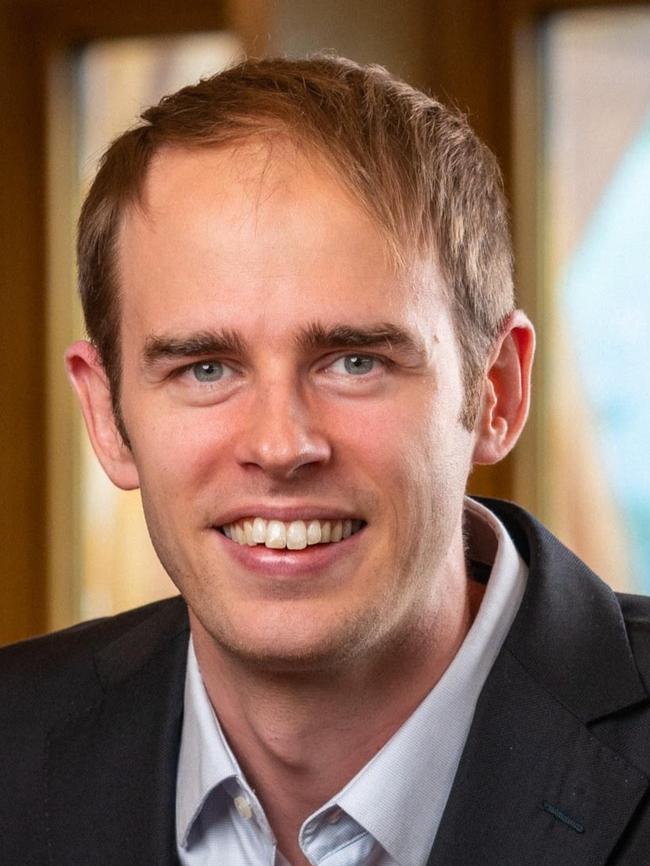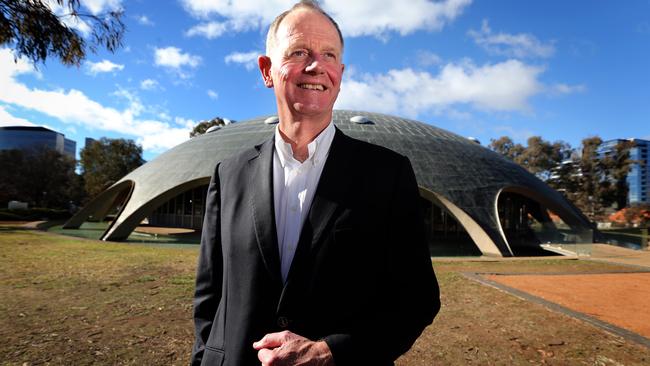‘A bit of bloody discipline’: No sleeping in, video games or junk food Graham Tuckwell’s family mantra
Exchange-traded fund pioneer Graham Tuckwell’s philosophy for his children is all about independence, which is why he first put son David’s ambitious ETF start-up under intensive scrutiny.

Rich-lister Graham Tuckwell has always wanted his four children to stand on their own two feet financially.
As the global pioneer of exchange-traded funds once put it, “You need to bring kids up with a bit of bloody discipline. You don’t let them sleep in every day, play video games and eat junk food.”
Which is why, beyond helping with housing and education, he has no interest in leaving vast amounts of wealth to them.
It also explains why he has put his eldest son’s maiden business venture in the ETF sector through a rigorous due diligence process.
David Tuckwell and Cliff Man have recently launched ETF Shares, the first new ETF provider in Australia in a decade.
Graham Tuckwell is chairman of the new firm and has backed it via his London-based venture capital fund, ETFS Capital, which also has stakes in publisher etf.com, crypto ETF provider 21 Shares and AI-powered custom index provider Alphathena.

“The decision to invest in the company was, in fact, made by my guys in the London team,” Graham Tuckwell says. “So for me being involved – obviously, David is one of my sons – I wanted it to be absolutely stand-alone and it needed to be at arm’s length. It had to stack up on its own merits.”
His son is chief investment officer of the new firm, while Man is chief executive. They previously worked together at New York-based ETF provider Global X.
“I’m very conscious that from Cliff’s perspective, it is important that he get treated as CEO. Just because David is one of my sons, it doesn’t mean he gets favours,” Tuckwell adds.
ETF Shares has launched with three international equity focused ETFs.
The BEST ETFS US Quality ETF covers 100 large US companies, the WWW ETFS US Technology ETF offers exposure to the largest and most liquid US tech companies, and the HUGE ETFS Magnificent 7+ ETF features the 10 largest Nasdaq-listed companies.

“Obviously I want to support the kids in commercial ventures that work. But equally I want them just to do what they really enjoy doing,” Graham Tuckwell says.
“As it happens, David really enjoys this and I’m really enjoying it. It is lovely being involved and chatting to him on a day-to-day basis. More importantly, it is actually his and Cliff’s business. It is not a business that I nurtured.”
Gold folklore
It is now folklore that Graham Tuckwell launched the first ETF gold fund on the ASX in 2003, which five years ago passed the billion-dollar mark in value. He later expanded the concept to stock exchanges across the world.
He then founded a firm he called ETF Securities Australia, which was sold 2½ years ago to Korean giant Mirae Asset Global Investments. His wealth was valued in March by The Australian at $848m.
His firstborn appears to be the only one likely to follow in his footsteps, given his other children are a philosopher, a lawyer, and the other wants to be a teacher.
“So I don’t think I’ll be waiting for any of the others to quickly jump into this area,” he quips.
David Tuckwell says that, as the eldest child, he was never pressured by his father to go into the ETF industry. In fact, his real passion is journalism and he laments not being “good enough” to make a career of it.

When his father was living in London, he worked for three years at ETF Stream, the leading publishing website on ETFs in Europe.
“I love journalism. I love the media. I read a newspaper every day and I have multiple subscriptions,” David Tuckwell says.
His work at ETF Stream was valuable preparation to work in the ETF industry, as was his upbringing. He is now deeply conscious of carrying on the Tuckwell legacy in the sector.
“When you are a teenager and you have your father busily typing away at a prospectus or a product disclosure statement, you don’t necessarily appreciate what is going on, especially given that Dad was also one of the founders of the global industry,” he says.
“So I didn’t necessarily appreciate what a lucky position I was in, getting the chance to be exposed to one of the best people in the world at what he does. I got the chance to build up all this advanced knowledge on this rapidly growing sector of the financial services industry. Being dragged along to gold conferences and being taught about basis points as a 14-year-old, I wasn’t really grateful for it at the time. But I certainly am now.”
With the Australian ETF market largely carved up by juggernauts such as Vanguard, Betashares, iShares and VanEck, which together captured 85 per cent of new flows in the first quarter of 2025, David Tuckwell knows the odds are stacked against him launching ETF Shares.
But far from being deterred, he sees the concentrated nature of the local industry as making it ripe for disruption.

“The Australian market, in our opinion, is quite lacking in competition compared to some other international ETF markets,” he says. “In Canada, there are over 20 index ETF issuers. The UK has over 30. The US has over 100. But here, just five maintain an active presence.”
He believes concentration has bred complacency, and he is betting on two ingredients to differentiate ETF Shares: innovation and low fees.
“We want to bring ideas to market that simply don’t exist here yet,” he says, claiming ETF Shares’ first three products are already trailblazers.
“None of them existed in Australia before. They are all first-of a kind.”
Focus on costs
But just as important is cost.
With ETF investors being notoriously fee conscious, ETF Shares is offering a flat fee of 29 basis points across the board.
“ETF fees compound annually. They are not a one-off like a movie ticket. They’re more like a phone bill that keeps ticking up,” David Tuckwell says.
Having launched gold ETFs decades ago, Graham Tuckwell still believes in the strategic role of gold in a diversified portfolio.
“Put 5-10 per cent of your portfolio in gold. Hope like hell it’s the worst-performing asset, because that means everything else is doing well,” he says.
“But when things go wrong, you want something stable. Liquidity is key. In the GFC, $9bn of our gold product was liquidated in two days because no one could get out of anything else.”
Gold, he argues, outperforms in the long run, particularly in markets such as Australia, which suffer from oligopolistic corporate structures and low growth compared to international peers.
Though they share DNA and a passion for ETFs, Graham and David Tuckwell are navigating their new venture from different cities, with the former in Melbourne, the latter in Sydney.
The physical distance, however, is bridged by constant communication. “We actually don’t see each other too much,” Graham Tuckwell says. “In some sense, the business gives us a reason to be talking almost every day, which is more than it would otherwise be.”

The father-son dynamic is not without its challenges, especially where to draw the line between family and business. Graham Tuckwell’s wife, Louise, has been both supportive and watchful of the collaboration.
“She likes it, but she’s just sometimes wary that both of us can have pretty strong views from time to time,” he says.
“Growing up in the family, you are just used to having those little chippy conversations. But business is business, and we all know that the best thing is for the business to succeed, which will make us all happy.”
His son echoes the sentiment, noting his mother has at times commented about the importance of keeping family and work separate. “But she was warmly supportive overall,” David says. “Because we do work well together at the end of the day. It is hard to find a situation like ours anywhere else in the ETF industry.”
Broader impact
While their venture is undeniably commercial, the two generations of Tuckwells view their success as a platform for broader impact.
Since they returned to Australia from London in 2019, Graham and Louise have established a family office called Rodber Investments, named after Louise’s late maternal grandparents, who she loved dearly.
They have also continued their philanthropic mission through the Tuckwell Foundation, renowned for its $100m commitment to student scholarships and residence halls at the Australian National University.
That commitment to giving back goes hand in hand with Graham Tuckwell’s philosophy on wealth and inheritance.
‘I’ve always said to our kids, ‘Do whatever you want to do, pursue it with hard work, determination and desire to succeed. But don’t think that you’re going to get paid a heap of money by Mum and Dad’,” he says.
“I actually want them to be happy and I don’t think giving handouts makes people happy. It might be a short-term sugar hit, but you read many stories about people who become trust fund kids. It just does all the wrong things.”
His eldest son has no issue with his parents’ position, noting he attended several elite private schools where he saw first-hand what inherited wealth can do, poisoning ambition and killing hunger.
David Tuckwell says the most important thing he has learned from his father is the importance of having integrity, in business and in life.
“Let people question anything about you. Let them question your intelligence and your work ethic, and they will forgive you if they are not there,” he says. “But don’t let them question your integrity. If they question that, the rest of it doesn’t matter.”
Graham Tuckwell has been forced to defend his integrity in recent years, in the media and the courtroom.
In May 2023 WisdomTree, the US-listed ETF manager that bought his European business, accused him of mistreating investors and attacked his alleged “highhanded, self-serving conduct and his violations of corporate governance practices”.
Tuckwell denied the claims, saying the firms had resorted to attacking him personally “out of complete desperation”.
In 2021, a Jersey court ruled that he acted “in a manner that was unfairly prejudicial to the interests of other shareholders” in selling shares in his ETFS Capital business for $600m, in which a group of private equity firms were minority investors.
The court ruled he should purchase the shares from the firms, minus a 20 per cent discount to reflect their minority interests as shareholders.
Ruling a victory
Tuckwell described the ruling as a victory because he had argued a discount should apply to the value of minority shares at a private company. He pledged to donate every dollar he saved by fighting the court battle to the Graham and Louise Tuckwell Foundation.
Tuckwell has always admired his eldest son’s ability to “think completely differently”.
“He pursues things with a passion, an absolute determination and he is incredibly single focused,” he says.
“I think he and Cliff are similar and that is why I think they can succeed in this venture. I’ve told them this is not going to be easy. It is going to be hard work.”
In ETF Shares, a second-generation Tuckwell venture is taking flight, not just with spreadsheets and pricing models, but with principle and purpose.
“The best thing is for the business to succeed, which will make us all happy. But really, what I would like to see is a bit like our scholarship program,” Tuckwell senior says. “I want to see the next generation succeed. That would give me a huge, warm feeling.”




To join the conversation, please log in. Don't have an account? Register
Join the conversation, you are commenting as Logout